Waheguru Ji Ka Khalsa Waheguru Ji Ki Fateh
This sakhi is narrated by Bhai Gurdas Ji in his vaars as follows:
ibp sudwmw dwldI bwl sKweI imqR sdwey]
bip sudhaamaa dhaaladhee baal sakhaaee mithr sadhaaeae
Sudama, a poor brahman, was known to be a friend of Krishna from childhood.
lwgU hoeI bwmHxI iml jgdIs dildR gvwey]
laagoo hoee baamhanee mil jagadhees dhalidhr gavaaeae
His brahmin wife always pestered him as to why he did not go to Lord Krishna to alleviate his poverty.
cilAw igxdw gtIAW kÎoN kr jweIey kOx imlwey]
chaliaa ginadhaa gatteeaaa(n) kao(n) kar jaaeeeae kaan milaaeae
He was perplexed and pondered over how he could get re-introduced to Krishna, who could help him meet the Lord.
phuqw ngr duAwrkw isMG duAwr Kloqw jwey]
pahuthaa nagar dhuaarakaa si(n)gh dhuaar khalothaa jaaeae
He reached the town of Duaraka and stood before the main gate (of the palace of Krishna).
dUrhuM dyK fMfauq kr C`f isMGwsx hir jI Awey]
dhoorahu(n) dhaekh dda(n)ddouth kar shhaadd si(n)ghaasan har jee aaeae
Seeing him from a distance, Krishna, the Lord, bowed and leaving his throne came to Sudama.
pihly dy prdKxw pYrIN pY ky lY gl lwey]
pehilae dhae paradhakhanaa pairee(n) pai kae lai gal laaeae
First he circumambulated around Sudama and then touching his feet he embraced him.
crxodk lY pYr Doie iSMGwsx aupr bYTwey]
charanodhak lai pair dhhoe shi(n)ghaasan oupar bait(h)aaeae
Washing his feet he took that water and made Sudama sit on the throne.
puCy kusl ipAwr kr gur syvw dI kQw suxwey]
pushhae kusal piaar kar gur saevaa dhee kathhaa sunaaeae
Then Krishna lovingly enquired about his welfare and talked about the time when they were together in the service of the guru (Sandipani).
lYky qMdl cibEn ivdw kry Agy phucwey]
laikae tha(n)dhal chabioun vidhaa karae agae pahuchaaeae
Krishna asked for the rice sent by Sudama’s wife and after eating, came out to see off his friend Sudama.
cwr pdwrQ skuc pTwey ]ù]
chaar padhaarathh sakuch pat(h)aaeae a
Though all the four boons (righteousness,wealth,fulfillment of desire and libereation) were given to Sudama by Krishna, Krishna's humbleness still made him feel totally helpless.
Sudama was born in a Brahmin family and raised in abject poverty. He was a childhood friend of Krishna. He had the supreme knowledge as well as superb control over his senses. Despite being poor, he was content with what he had but his wife Susheela was frustrated.
One day, unable to control her hunger, she told Sudama: "Krishna is your fast friend. Why don't you go to Him? When He comes to know about our harships, He will certainly come to our aid".
Sushila thus requested him several times. Finally, Sudama thought: 'Though I am facing the problem of poverty, it will be only an excuse to meet Krishna, as I only want to have His sight'. Thinking thus, Sudama asked his wife to get something which he could present to Krishna. At that time, there was not even a grain of rice in their home. So, Susheela borrowed four handfuls of parched rice from her neighbour. Tying it in a bundle, she handed it to Sudama. Sudama at once set out for Dwarka. On the way, he was wondering about whether he would be able to recognize Krishna. Though they had been together in the Gurukul (school), but it was long ago.
Krishna and Sudama studied together at sage Sandipani's Gurukul. Finishing his education in a short time, Krishna came to Dwarka and became the king. On the other hand, Sudama too returned to his native place and started his married life. It would be their first meeting ever since they had left Sandipani's Gurukul. Would Krishna remember him or not?
Throughout the journey, he pondered over the same dilemma. Reaching Dwarka, he sent information to Krishna about his arrival and as soon as Krishna heard about Sudama's arrival, He came running to him and embraced him. The mere touch of Krishna's body was a transcendental experience for Sudama.
Krishna escorted Sudama to His private chamber in the palace and offered him a seat and began to wash his feet. He pitied Sudama's condition. When He held Sudama's feet, tears rolled down Krishna's cheeks. Sudama's feet were washed by Krishna's tears. Seeing Krishna's condition, the queen Rukmani too washed Sudama's feet. Krishna then sprinkled the residual water over His head. Krishna then bedecked Sudama with scented flowers, sandal, Durva grass, Dhoop, Deep, garlands etc. He also offered him royal food to eat, then got his mouth and hands washed. Thereafter, He offered him betel leaves, nuts etc. to freshen his mouth.
Thus eating to his fill, Sudama sat near Krishna chatting. All the queens of Krishna began to fan him. Krishna too sat near him, holding his hand and chatting. Krishna said to Sudama: "Friend, I know that even living under abject poverty, you have never longed for luxuries. People like you are indeed rare who remember me and recite my name selflessly. Friend, you will recall the time when we were together in the Gurukul. You may also recall the day, when we had left the Gurukul and obeyed our teacher's orders to go to the forests and collect wood for fuel. We were then caught in a heavy storm. It was dark all around even before sunset and with water everywhere all round, we were therefore forced to spend the night in the forest. At sunrise, when Guru Sandipani came to know about us, he had himself arrived in the forest. Seeing us, he had said: "Sons, you have borne a lot of suffering for me. Everyone wants to protect himself, but without caring for yourselves, you have served me. I am very pleased with you. May all of your desires and ambitions be completed".
"O friend, it is by the grace of the teacher that a human being gets peace and all the luxuries". Sudama then said: "Krishna, I got the privilege of receiving education at the Gurukul in your company. That you had to stay at the Gurukul to study the Vedas was not a play by you in human form".
Thus talking about the bygone days, Krishna soon came to know what was in Sudama's mind. So, humorously, He asked Sudama what he had brought from home as a gift for Him. "Whatever little my beloved devotees offer me is enough to please me. I not only accept that offerings but also eat it happily at once". Now, Sudama felt shy and began to hide his bundle. He stared downwards. Krishna thought: 'This friend of mine has never recited my name with wealth as his ulterior motive. Even now he has come only at the insistence of his chaste wife. I will therefore now give him such wealth that is rare even for the gods'. Thinking thus, Krishna snatched the bundle from Sudama and opened it. Finding the parched rice in it, He exclaimed: "O friend, you have brought me a wonderful gift". Saying thus, He ate a handful of the rice.
While He was about to eat another handful, Rukmani held His hand and said: "O soul of the universe, to give this man prosperity in this world and in another, eating one handful of parched rice is enough". Thus, at the insistence of Rukmani, Krishna gave up His desire to take another handful of rice.
That night, Sudama stayed at Krishna's palace. There, he experienced heavenly comforts. Next day, at the time of his departure also, Sudama did not say anything apparently to his friend Krishna about his desires. He was overjoyed merely by meeting Him. Immersed in joy, he started for his home. On his way, Sudama was thinking: 'I myself saw the dedication of Krishna for Brahmins. How He raised a poor man like me and embraced me, He made me sleep on His bedstead, Rukmani her self fanned me. Krishna himself pressed my feet and worshipped me as if I were the Lord. He has the capability of giving me everything but did not give me anything. Perhaps He might be fearing that getting wealth I would forget Him".
Reflecting thus all through the way, Sudama reached home. But his little hut was no longer there. In its stead stood a grand palace with beautiful gardens around it. Confused Sudama began to think that he had come to a wrong place. But he was sure that at the very same place once stood his little hut. He was thus perplexed when many beautiful men and women came out singing and welcomed him. Seeing her husband arrived, Susheela too was full of joy. She at once came out of the palace and greeted him touching his feet. She was adorned with different types of ornaments then and surrounded by maids.
Seeing his wife in such luxury, Sudama felt surprised. Even then, he entered the palace with her. He was now sure that his friend Krishna was his real supporter. He knows what is in His devotee's mind but remains silent. "Such is the generosity of my friend Krishna. He is satisfied with whatever little the devotees offer Him. I had presented Him with only a handful of parched rice, but magnanimous Krishna accepted that lovingly. May I, in my many births get His love and friendship. I do not want wealth and luxuries. I only long for love for His feet".
Thus, unaffected by all the allurements, Sudama lived along with his wife Susheela in the palace that they had received as a bounty from Krishna. Day by day, their love for Krishna grew.
------------------------------------------------------------------------------------------------
Does anyone want to explain what the moral of this sakhi is?
Waheguru Ji Ka Khalsa Waheguru Ji Ki Fateh
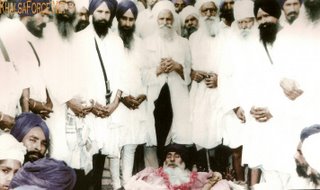
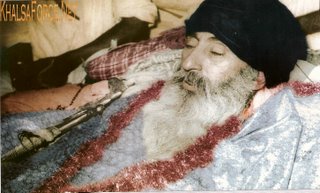
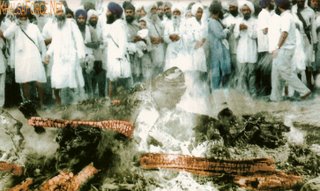 For more rare pictures of Sant Gyani Baba Gurbachan Singh Ji Khalsa Bhindranwale visit Khalsa Force's new picture gallery.
For more rare pictures of Sant Gyani Baba Gurbachan Singh Ji Khalsa Bhindranwale visit Khalsa Force's new picture gallery.
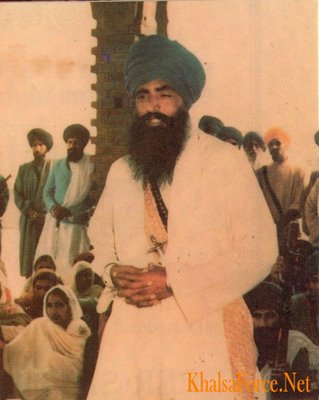
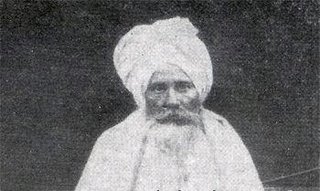
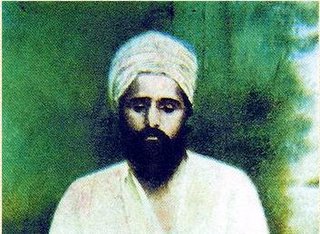 Sant Baba Bishan Singh Ji Muralewale replied,
Sant Baba Bishan Singh Ji Muralewale replied,